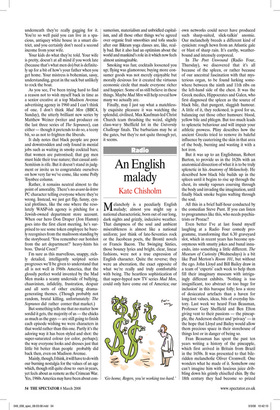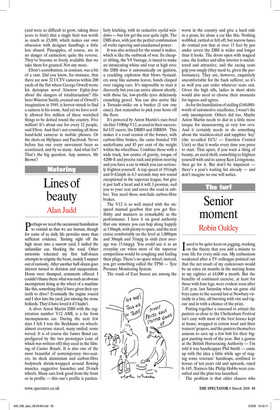An English malady
Kate Chisholm
Melancholy is a peculiarly English malady; almost you might say a national characteristic, born out of our long, dark nights and grizzly, indecisive weather. That dampness of the soul and ambient miserableness is almost like a national uniform; just think of late-Seventies rock or the Jacobean poets, the Brontë novels or Francis Bacon. The Swinging Sixties, those bouncy lyrics and bright, clear, linear fashions, were not a true expression of English character. Quite the reverse; they were an aberration, the exact opposite of what we’re really and truly comfortable with being. The heartless sophistication of that super-hyped new TV series Mad Men, could only have come out of America; our own networks could never have produced such sharp-suited, slick-talkin’ anomie. Our melancholy breeds a different kind of cynicism: rough hewn from an Atlantic gale or blast of sharp rain. It’s earthy, weatherbound and intensely corporeal.
In The Poet Unwound (Radio Four, Thursday), we discovered that it’s all because of the spleen, or rather because of our ancestral fascination with that mysterious organ, to be found lurking somewhere between the ninth and 11th ribs on the left-hand side of the chest. It was the Greek medics, Hippocrates and Galen, who first diagnosed the spleen as the source of black bile, that pungent, sluggish humour. A little of it, they reckoned, is good for us, balancing out those other humours: blood, yellow bile and phlegm. But too much leads to splenetic behaviour and will impair your athletic prowess. Pliny describes how the ancient Greeks tried to remove its baleful influence by cauterising the skin in that area of the body, burning and wasting it with a hot iron.
But it was up to an Englishman, Robert Burton, to provide us in the 1620s with an anatomical dissection of what it is to be truly splenetic in his Anatomy of Melancholy. He described how black bile builds up in the spleen until it begins to rise up through the chest, its smoky vapours coursing through the body and invading the imagination, until finally black smoke begins wafting through the soul.
All this in a brief half-hour conducted by the comedian Steve Punt. If you can listen to programmes like this, who needs psychiatrists or Prozac?
Even better I’ve at last found myself laughing at a Radio Four comedy programme, transforming that 6.30 graveyard slot, which in recent years has become synonymous with smutty jokes and banal innuendo, into something a little different. The Museum of Curiosity (Wednesdays) is a bit like Paul Merton’s Room 101, but without the ego. John Lloyd and Bill Bailey draw in a team of ‘experts’ each week to help them fill their imaginary museum with intriguingly different exhibits. ‘Nothing is too insignificant, too abstract or too huge for inclusion’ in this baroque folly; less a store of desiccated artefacts than a haven for long-lost values, ideas, bits of everyday history. Last week we heard Fran Beauman, Professor Gary Sheffield and Ben Elton giving vent to their passions — the pineapple, the Anderson shelter and ‘privacy’ — in the hope that Lloyd and Bailey would allow them precious space in their storehouse of things lost or in danger of being so.
Fran Beauman has spent the past ten years writing a history of the pineapple, which first arrived in Britain from Brazil in the 1650s. It was presented to that bileridden melancholic Oliver Cromwell. One wonders what he made of it. Somehow one can’t imagine him with luscious juice dribbling down his grimly chiselled chin. By the 18th century they had become so prized (and were so difficult to grow, taking three years to fruit) that a single fruit was worth as much as £5,000, which makes our own obsession with designer handbags a little less absurd. Pineapples, of course, are in no danger of extinction; quite the reverse. They’ve become so freely available that we take them for granted. Not any more.
Elton’s contribution, in contrast, was a bit of a rant. Did you know, for instance, that there are now 32 CCTV cameras within 200 yards of the flat where George Orwell wrote his dystopian novel Nineteen Eighty-four about the dangers of totalitarianism? His hero Winston Smith, created out of Orwell’s imagination in 1949, is horror-struck to find a camera in his room. And yet we have coolly allowed five million of these wretched things to be dotted round the country. Five million! It’s about one for every 12 people, said Elton. And that’s not counting all those hand-held cameras in mobile phones. Or the shots on MySpace and Facebook. Never before has our every movement been so scrutinised, and by so many. And what for? That’s the big question. Any answers, Mr Brown?



















































































 Previous page
Previous page